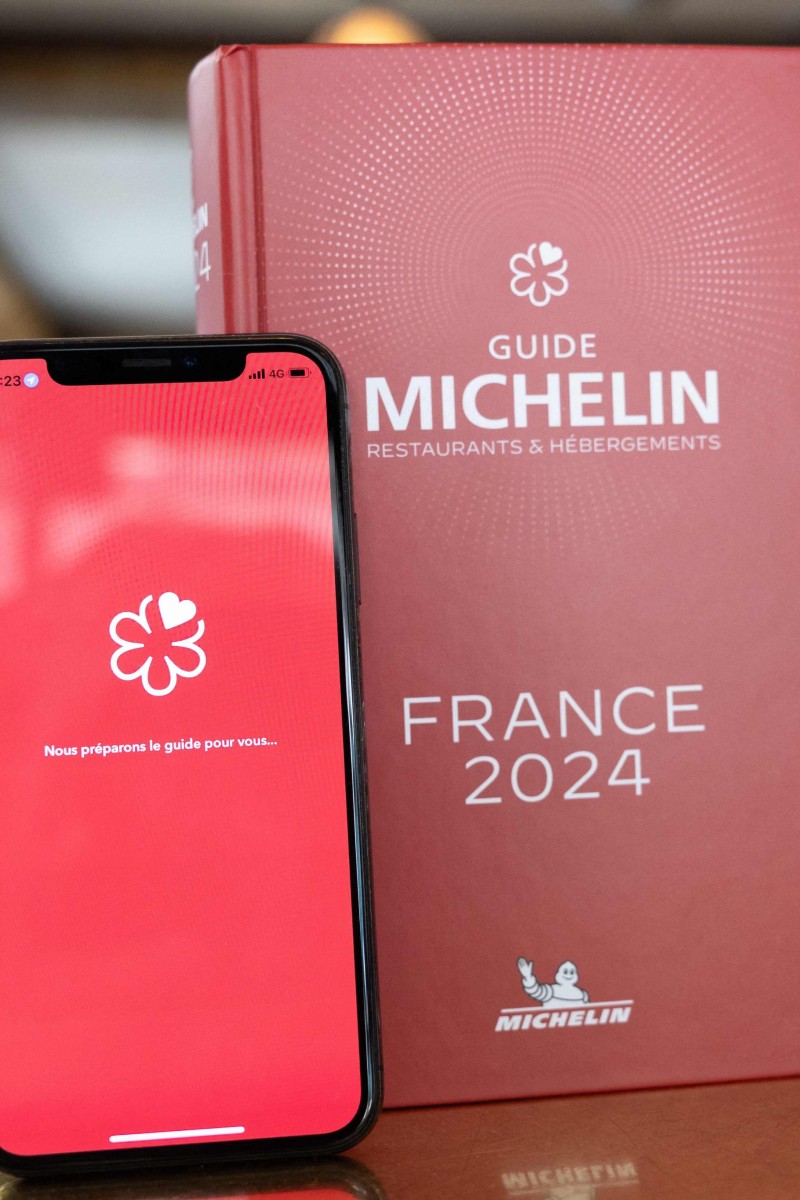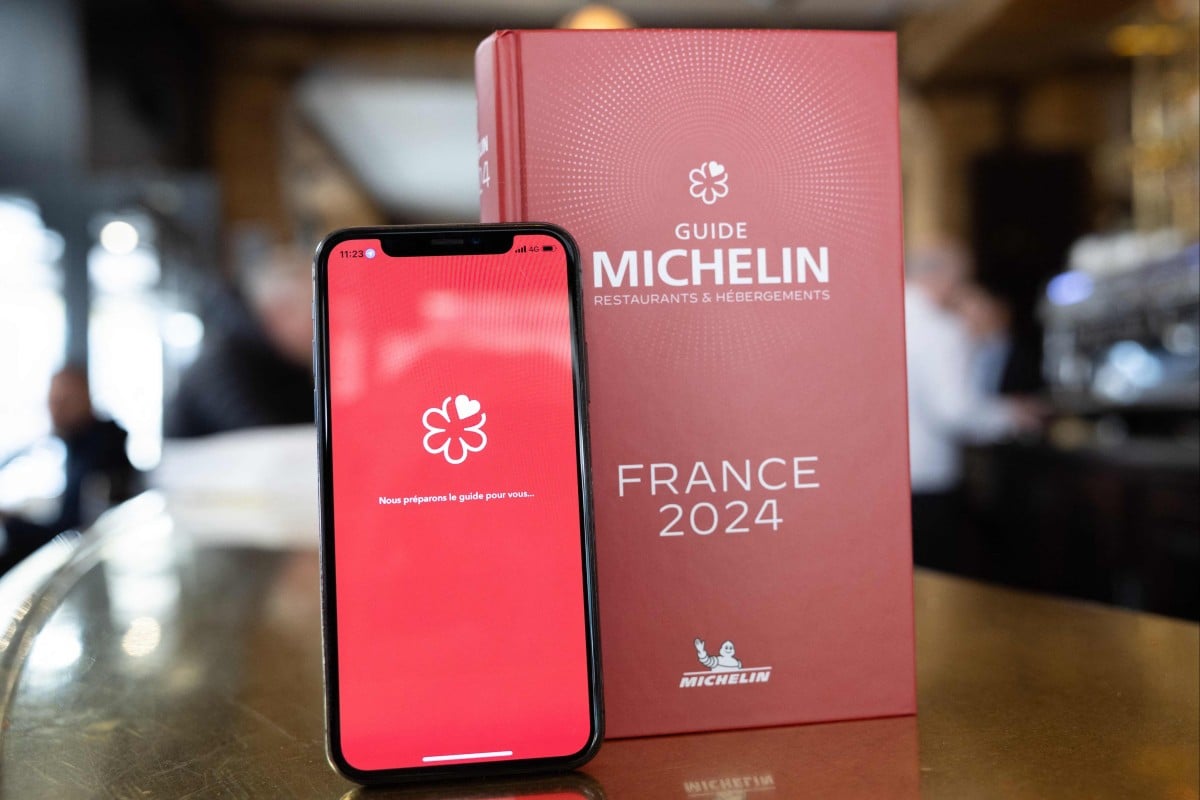
5-minute listening: All about the secret agents of the Michelin Guide
- Most eateries have joined the ranks for the first time, including 23 that have been open for less than a year
- Practise your English with our short listening exercises: play the audio; answer the questions; and check the answers at the bottom of the page
 The Michelin Guide awards up to three stars for excellence to a select few restaurants. Photo: AFP
The Michelin Guide awards up to three stars for excellence to a select few restaurants. Photo: AFPQuestions
1. What did the Michelin Guide unveil last month?
A. a new restaurant chain
B. its annual list of best hotels
C. its annual list of best French restaurants
D. a new rating system for restaurants
2. How many restaurants received three stars this year?
A. 23
B. 32
C. 62
D. information not given
3. How many people apply to become Michelin inspectors every year?
A. less than 3,000
B. close to 5,000
C. more than 7,000
D. about 10,000
4. What are two qualities that Michelin looks for in potential inspectors?
A. professionalism and being willing to try new things
B. experience in people management and strong writing skills
C. expertise in diverse cuisines and a love of travel
D. a background in hospitality and a keen sense of smell
5. What do we know about Michelin’s inspectors based on the podcast?
A. They include both men and women.
B. They come from 25 different countries.
C. These inspectors work in the 45 places that Michelin covers around the world.
D. all of the above
6. If someone is “sworn to secrecy”, they ...
A. tried to tell the truth about someone who has not been honest.
B. made a promise to keep something confidential.
C. convinced others that they are sure something is true.
D. said something that is not true to deceive someone.
7. Based on your understanding of the podcast, what is one benefit of being a Michelin inspector?
A. the ability to own and operate their own restaurant
B. being paid to dine at the best restaurants in the world
C. a flexible work schedule
D. the chance to interact with famous chefs
8. How long does the training period for a new Michelin inspector typically last?
A. almost three months
B. less than one year
C. up to two years
D. as long as five years
9. Which word can replace “experienced” in the podcast?
A. seasoned
B. mature
C. wise
D. sophisticated
10. What does the phrase “inner circle” refer to?
A. other Michelin inspectors
B. a group of trusted friends
C. editors of the Michelin Guide
D. none of the above
11. Why does Michelin allow close family members of inspectors to accompany them on restaurant visits?
A. because family members are required to provide feedback as well
B. to prevent restaurants from suspecting the inspectors
C. because inspectors can only review restaurants that cater to families
D. to help finish all the food on a tasting menu
12. What is the most common cover story used by Michelin inspectors?
A. They tell people they are consultants for restaurant businesses.
B. They claim to be on a holiday focused on exploring different cuisines.
C. They pretend to be food critics writing for a major publication.
D. They say they are keen on opening a restaurant business.
13. What do some Michelin inspectors do when they make restaurant reservations?
A. They give false names and change their phone numbers.
B. They wear elaborate disguises to avoid being recognised.
C. They book tables at least a year in advance to avoid suspicion.
D. They request specific seating arrangements where they can dine in privacy.
14. Besides food, what other aspects of a restaurant experience do Michelin inspectors evaluate according to the podcast?
A. the qualifications of the restaurant’s chefs
B. the popularity of the restaurant
C. the cleanliness and appearance of the restrooms
D. the number of years the restaurant has been operating
15. Why might a Michelin inspector need to visit a restaurant more than once?
A. to bring a different family member on each visit
B. to ensure they receive the same quality of food and service on all visits
C. to personally verify the freshness of ingredients used in different dishes
D. to build rapport with the restaurant and become a regular customer
Answers
1. C
2. D
3. C
4. A
5. D
6. B
7. B
8. C
9. A
10. D
11. B
12. A
13. A
14. C
15. B
Script
Adapted from Agence-France Presse
Voice 1: The Michelin Guide unveiled its annual list of the best French restaurants last month. A total of 62 restaurants were awarded at least one star – most of them were joining the ranks for the first time, including 23 that have been open for less than a year.
Voice 2: Have you ever wondered who chooses the restaurants on the list? They are the secret agents of the Michelin Guide. Each year, the guide receives 8,000 applications to become an inspector. The key criteria are professionalism, as well as openness to new experiences.
Voice 1: Michelin does not say how many inspectors it employs. This strict secrecy ensures they are never recognised by a restaurant and given preferential treatment. The guide does reveal that its inspectors currently include 25 different nationalities, and men and women of all ages. They operate across the 45 destinations covered by Michelin.
Voice 2: It is a full-time job, and all of the inspectors come from the world of fine dining and hospitality: applicants must have at least 10 years of experience as chefs, sommeliers or hoteliers. Michelin inspectors are paid to eat in the best restaurants in the world – but the price is having to lie about the job even to their friends. This is because they are sworn to secrecy.
Voice 1: A new inspector is paired with a more experienced colleague for a training period of up to two years – or around 800 meals. The inspector then lives undercover. Only their inner circle of family are allowed to know – and they have an interest in keeping quiet since they often tag along to meals to avert suspicion. The most common cover story that inspectors give to others is that they are working with restaurants on business strategies.
Voice 2: They give false names and change their phone numbers when making reservations since many restaurants scan their bookings for journalists and inspectors. The inspector must recall the tiniest details of the food, service and ambience – right down to the appearance of the toilets – without taking notes, though phone pictures are now common. They must also research the wider context: the restaurant’s suppliers, how it fits into the local community and its finances.
Voice 1: The final report sticks to five criteria: the quality of the ingredients, the culinary technique, the harmony of the flavours, the emotion that the chef hopes to convey through their menu, and the restaurant’s consistency. The latter requires multiple visits. The awarding of a star – with three stars as the top prize – must be a unanimous choice when inspectors meet to discuss their reviews. If there is disagreement, further visits are organised until everyone agrees.